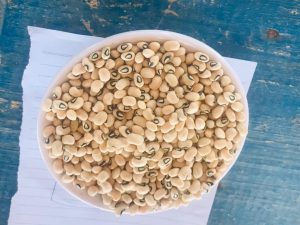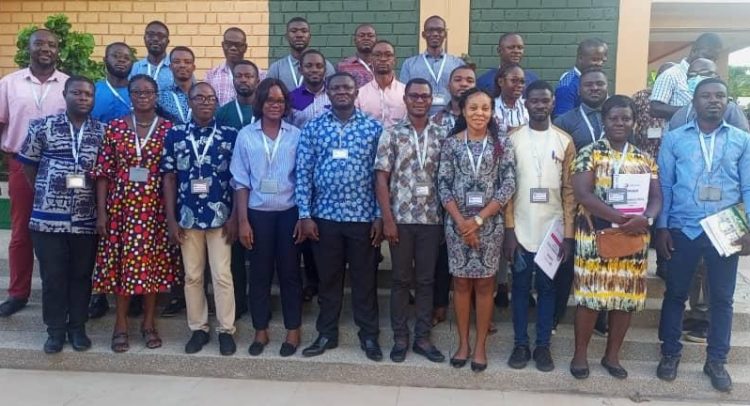Ghanaian scientists have revealed that all is set for the release of Ghana’s first genetically modified crop known as GM Bt Cowpea.
Some food items made from cowpea are Koose, Gari&beans, Waakye, Tubaani among others.
The Savannah Agricultural Research Institute (SARI) of the Council for Scientific and Industrial Research (CSIR) has submitted an application to the National Biosafety Authority requesting approval to release into the environment GMO cowpea which has inherent resistance to pest attacks.
This was made known when the Alliance for Science in partnership with the International Institute for Tropical Agricultural (IITA), the Open Forum on Agricultural Biotechnology (OFAB), the Ghana Agricultural and Rural Development Journalists Association(GARDJA), and the Savannah Agricultural Research Institute(SARI) of the Council for Scientistic and Industrial Research(CSIR) organized a workshop/field visit for journalists in Tamale in the Northern region.
About 30 media practitioners who report on issues of agriculture and environment and related issues were selected from across the country to participate in the training and field visit to Savannah Agricultural Research Institute(SARI) at Nyankpala in the Northern region.
The field visit is aimed at equipping journalists with knowledge of what GMO crops are to offer them with firm understanding of what GMO cowpea is, build evidence based awareness of Ghana’s GMO crops particularly Bt cowpea, help journalists see GMOs as living crops, help journalists build a strong network with scientists , farmers and other stakeholders working on GMOs and also generate more benefits based conversations about GMOs on mainstream media platforms.
Resource persons such as Richard Frimpong (GARDJA President), Joseph Opoku Gakpo(Allience for Science), Dr. Richard Oteng Frimpong (Plant Breeder, Savannah Agricultural Research Institute), Dennis Balfour Awuah(Allience for Science), Dr. Joseph Adjebeng-Danquah(Biosafety Officer, Savannah Agricultural Research Institute), Dr. Richard Ampadu-Ameyaw(OFAD Ghana Coordinator), Reuben Quainoo(Allience for Science), Abigail Akoto(Allience for Science) and Dr. Jerry Nboyine(Principal Investigator, Bt Cowpea Project) took time to educated journalists about GMOs and its related issues.
At the GMO Cowpea trial field , Dr. Jerry Nboyine, Principal Investigator, Bt Cowpea Project told journalists that farmers have witnessed the trial and they have confidence in the crop.
According to him, the normal variety farmers use , for every acre farmers are expected to harvest about 20 bags but farmers hardly harvest up to 5 bags.
“ So you can imagine from 20 to 5 bags that means they are losing about 15 bags because of the insect called maruka and once we have the Bt cowpea out there that means farmers will be able to increase their yields by 4 folds which means the crop will be available in sufficient quantities for everyone to buy and the high cost of beans will definitely come down.”
He indicated that the release of the Bt cowpea will complement the Planting for Food and Jobs programme which seeks to support farmers to produce more and earn money.
Dr. Nboyine disclosed that Bt cowpea will serve as meat for the poor man because those who cannot afford meat can rely on beans to meet their protein needs.
The Principal Investigator noted that Ghana’s annual demand for cowpea is estimated as 169,000 tons meanwhile Ghana produces 57,000 tons adding that the deficit is catered for from imports from countries such as Burkina Faso, Nigeria and Niger.
“ When farmers begin to produce this here and they are increasing their yields what it means is that the amount of foreign exchange that we spend to bring beans into the country will be stopped and that will save our currency and the depreciation that we experience that we complain is contributed by some of these importations but once we are able to produce enough domestically then we will not spend so much to look for foreign exchange to import beans into the country.”
He lamented about the rate at which the country import grains adding that it will make Ghanaian farmers poor because customers will prefer the imported one because it will be cheap in the market compared to the one the Ghanaian farmer produces.

On post harvest losses, he said once farmers harvest and follow through the laid down protocols in the area post harvest management instructed by the scientists, issues of post harvest losses can easily be handled.
Dr. Richard Ampadu-Ameyaw(OFAD Ghana Coordinator), said the GM Bt cowpea has been introduced to complement the work the non GMO is doing noting that it will tackle some diseases or pest that the non GMO cannot combat.
“ Nobody is saying this new one is coming to replace the old one ,no if you are a farmer and you still want to keep the old one that’s fine but if you want to add the new one that’s also the choice of the farmer.”
He debunked claims that GMOs are chemical crops produced to kill human beings.
“There’s no chemicals in it meant to kill anybody so there’s no fear, the scientists who are working on it are also humans so why will a scientist develop something that it poisonous for another to eat and this crop is being developed here in Ghana by local scientists so we are not foreigners.”
A farmer , Karim Nindoo expressed excitement about the GM Bt cowpea and indicated that they are patiently waiting for the approval of the crop so that they can plant it.
According to him, they normally spray about 5-8 times on the farm to tackle pest and other related insects but with the GM bet cowpea a farmer will only need to spray only twice which is less expensive for them.
He appealed to the government and the authorities in charge of the approval to ensure that they fast-track approval of the GM Bt cowpea to enhance farming in the country.
FROM Eric Kombat, Tamale


